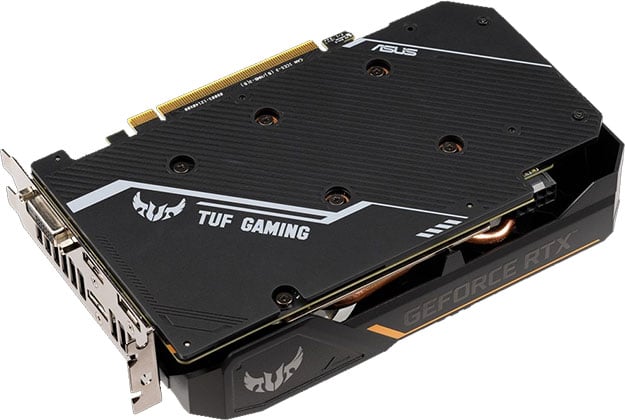If you head over to the graphics card section on
ASUS's website, you'll notice a couple of new product listings based on
NVIDIA's latest
Turing GPU architecture—the TUF GeForce RTX 2060 OC Edition (TUF-RTX2060-O6G-GAMING) and TUF GeForce RTX 2060 (TUF-RTX2060-6G-GAMING).
As the model names imply, these new cards have been given the "TUF" treatment, which means they're built with a bit more durability in mind than non-TUF cards. Part of that entails the use of dual-ball fan bearings, which ASUS claims can last up to twice as long as sleeve-bearing designs. IP5X dust resistance is also part of the package.
"Dust is enemy number one for fans. It's easy to clean the blades, but taking the housing apart to remove dust that has made its way inside is not a simple task. The TUF 2060 comes with high-quality IP5X certified dust resistant fans, so you don't need to worry about performance degradation over time," ASUS explains.
It's somewhat of a dubious selling point, especially when a combination of dust filters (on your case) and periodic blasts of compressed air should keep dust bunnies from taking residence. However, if you live in a particularly dusty environment, the added protection can't hurt.
ASUS also says its TUF Gaming cards go through a 144-hour validation program. This consists of a "series of stringent test to ensure compatibility with the latest games," and presumably to weed out potentially bad cards.
The cards are relatively compact, measuring just a hair over 8 inches long. As for clockspeeds, here's how it all breaks down:
- ASUS TUF GeForce RTX 2060 OC (Gaming Mode): 1,365MHz base, 1,710MHz boost
- ASUS TUF GeForce RTX 2060 OC (OC Mode): 1,365MHz base, 1,740MHz boost
- ASUS TUF GeForce RTX 2060 (Gaming Mode): 1,365MHz base, 1,689MHz boost
- ASUS TUF GeForce RTX 2060 (OC Mode): 1,365MHz base, 1,710MHz boost
NVIDIA's reference specs for a
GeForce RTX 2060 call for a 1,365MHz base clock and 1,680MHz boost clock, so both cards offer a bit of extra speed at the top end. Bear in mind that your case's cooling will play a partial role in how long these cards can maintain their boost clocks.
Connectivity options are the same on both cards—they each offer two HDMI 2.0b outputs, a DisplayPort 1.4 output, and a DVI-D output.
ASUS did not say when these cards will be available or how much they will cost. That said, NVIDIA launched the GeForce RTX 2060 at $349, making it the least expensive pathway to real-time ray tracing and DLSS.



